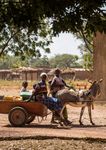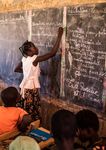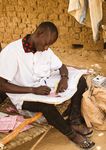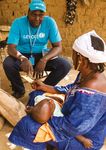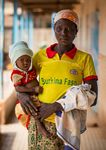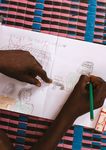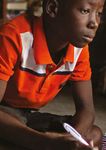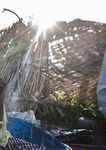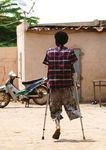Central Sahel Advocacy Brief - January 2020
←
→
Page content transcription
If your browser does not render page correctly, please read the page content below
Children under attack
The surge in armed violence across Burkina
Faso, Mali and Niger is having a devastating
impact on children’s survival, education,
protection and development. The Sahel, a
region of immense potential, has long been
one of the most vulnerable regions in Africa,
home to some countries with the lowest
development indicators globally.
© UNICEF/Juan Haro
Cover image: © UNICEF/Vincent TremeauThe sharp increase in armed attacks on communities, schools,
health centers and other public institutions and infrastructures is at
unprecedented levels. Violence is disrupting livelihoods and access
to social services including education and health care. Insecurity is
worsening chronic vulnerabilities including high levels of malnutrition,
poor access to clean water and sanitation facilities.
As of November 2019, 1.2 million people are displaced, of whom
more than half are children.1 This represents a two-fold increase in
people displaced by insecurity and armed conflict in the Central Sahel
countries in the past 12 months, and a five-fold increase in Burkina
Faso alone.*
Reaching those in need is increasingly challenging. During the past year,
the rise in insecurity, violence and military operations has hindered
access by humanitarian actors to conflict-affected populations.
The United Nations Integrated Strategy for the Sahel (UNISS)
continues to spur inter-agency cooperation. UNISS serves as the
regional platform to galvanize multi-country and cross-border
efforts to link development, humanitarian and peace programming
(triple nexus). Partners are invited to engage with the UNISS
platform to scale-up action for resilience, governance and security.
A humanitarian emergency is unfolding, with the risk of spillover to the
neighbouring coastal countries.
UNICEF calls on government and their partners to invest and
strengthen emergency preparedness systems of national
institutions to be ready to scale-up essential services in the
event of insecurity or in case of an influx of displaced people.
1 UNHCR operational data portal 30 November (Burkina Faso, Mali, Niger), OCHA Burkina Faso, Humanitarian Snapshot 9 December 2019;
CMP Mali 21 November 2019 Report, DREC Niger statistics of September 2019
* January 2019 to End-November 2019 data comparisonOver 670,000 children
forced to flee their homes
1.2. million internally displaced persons and refugees*
Burkina Faso: 585,955 | Mali: 226,158 | Niger: 399,102
*including 55% children Kidal
Mali
Mauritania Tombouctou
Gao
Mopti Dori
Kayes
Koulikoro
Segou
Kaya
Bamako
Ouagadougou
Fada-
Burkina Ngourma
Sikasso Faso
Côte Togo
Sierra
Leone d'Ivoire
#People displaced
(IDPs + Refugees in thousands)
UNICEF offices Refugee camps 50
Source: OCHA, UNHCR, IOM, governments of Burkina Faso, Mali, Niger.
The boundaries and names shown and the designations used on this map do not imply official endorsement or acceptance by UNICEF.
3 Central Sahel Advocacy Brief UNICEF January 20204.9 million children in
Algeria need of humanitarian
assistance 2
Niger
Menaka
Agadez
Tahoua
Zinder
Tillabery
Maradi Chad
Niamey
Dosso Diffa
Nigeria
Delivering humanitarian assistance, including in hard-to-reach
areas and to communities that host displaced populations, is a
priority. Coordination by all actors is needed to assess, open and
maintain access to affected populations.
2 Amend footnote: Draft 2020 Humanitarian Response Plans/ UNICEF Humanitarian Action for Children (Burkina Faso, Mali and Niger),
as of December 2019.
UNICEF January 2020 Central Sahel Advocacy Brief 4Security incidents
•
•
Algeria
•
•• • •
•• Niger
Mauritania Mali
• •
• •
• • •
2014-15 •
•• • • •• ••
•••
•• •
• •
•
•
•
• • • • • •
• • •• • • • •• •• •
• • ••• •• • • • • •
• • • • • Chad
• • • ••••
• • • ••••••
••
• ••• •
••
• • •
• •
Senegal Burkina• • •
• • Faso
• ••
• •• • ••
Guinea •• Benin Nigeria
Côte • • Ghana Togo
•
Sierra • • Cameroon
Leone d'Ivoire •
•
•
Algeria
•
••• •
• • •
• • Niger
Mali • • •
Mauritania ••• • •
• •
• •
2016-17
•
• •• •
• • •• •• • • •
•• • • • •• •
•
• •
•• • •
• • • •
•• •••• •• • • • • ••••• • •• • •
• •
• • • • •• • ••••• •• •••••• • ••• • •••• • • • • •
•
•• • •• •• ••••••••••• •• ••• ••••••••••••••••••• •••• • • •
• • • • • • • •• • •••
• • ••••• • ••• • • •••••• • Chad
• • • ••••••• •• • • • • •••••
••
• • •••
•• • • •
•
•
• •• •••• • ••
Senegal Burkina •
Faso• • • • • ••
• •
Guinea • • •• Benin Nigeria
Côte•
• •
Togo
Sierra • Ghana •
Cameroon
Leone d'Ivoire • •
• • •
• • • •
•
Algeria
•
•••
•• • • •
• Niger
Mauritania • Mali • • •
• •
• ••• •
• •
2018-19 • • •••••
• •• •••••••• • •
• •• • •• • ••
• • •••• ••• • •• • ••
•• ••
• •• •••• •
••
••• •
•
•
•
•
•••• •• •• • •• •• •• •••• ••••••••••••••••••• ••• • •
• • • •• • • •••• • • • •• •••• •• •• • •
•• • •• •• ••••••••••• ••••••••••••••••••• ••••••• ••• ••••••••••••••••••••••• • •••• • •
• •• • • • ••••••••••• ••••••••••• ••••••••••••••••••••••••••••••••••••• • • • • •
• • • •••• ••• ••• •••••• ••• •••••••••••••••••••••••• ••• • • • ••
• • •• • ••••••••••••••••••••••••••••••••••••••••••••••••••••••••••••••••••••••••••••••••• • • • •
• • ••••••••• Chad
•• ••• •• • ••••••••••••••••••••••••• • ••••••••••••••••••••••• ••••••••• • ••••• • • •• •• ••••• •••••
• ••
• • • •• ••••••• •• • • • •••• • • •••••• • ••• ••••••••••
• • • • ••
•• • • •••• • • • ••••••••••• •
• •• ••• ••
• •••••• • ••••••••
• •• • •
•• • • • • •• •••• •
•••• • • ••••••• ••
Senegal
•• •Faso ••
Burkina
•
•• • •••
• •• • • • •• •••••••
• ••• • • •• •
Guinea • • • Benin Nigeria
••••• • • • ••Togo
Sierra Côte• • • Ghana • •• •• • • •
Cameroon
Leone d'Ivoire • • •
• •• •
•
Source: Armed Conflict Location & Event Data Project (ACLED) 2 year window data; data filtered for security incidents include ‘Battles’
or ‘Explosions/Remote violence’ or ‘Violence against civilians’ according to ACLED definition.
The boundaries and names shown and the designations used on this map do not imply official endorsement or acceptance by UNICEF.
5 Central Sahel Advocacy Brief UNICEF January 2020Over the past 2 years armed groups have intensified attacks in parts of Burkina
Faso, Mali and Niger. Insecurity is spreading at a rapid pace. Women and children
are bearing the brunt of the violence. Renewed, increased and concerted efforts
are needed to curb the ongoing violence in Burkina Faso, Mali and Niger and stop
it from spreading further into neighbouring countries.
In this dangerous and volatile security context, UNICEF calls
on all military forces and non-state armed groups to respect
humanitarian spaces allowing safe and sustainable access
to deliver humanitarian assistance to affected populations,
including women and children, wherever they are.
© UNICEF/Bindra
UNICEF January 2020 Central Sahel Advocacy Brief 6Attacks and threats
on schools, students
and teachers
Education is a major challenge across the affected countries. In Burkina
Faso, Mali and Niger over 8 million children, 6-14 years old, are out of
school, which represents almost 55 per cent of children in this age
group.3 Across the Central Sahel, attacks and threats on schools and
against teachers and students are becoming more and more common,
which further worsens the situation of children.
Between April 2017 and December 2019, More than 20 direct attacks against schools
Burkina Faso, Mali and Niger witnessed and education personnel have been reported
a six-fold increase in school closures due during the summer school break in Burkina
to violence.4 More than 3,300 schools are Faso and around the beginning of the
closed as of December 2019 affecting academic year in Niger and Mali, from July
almost 650,000 children and more than to October 2019.6 Threats against schools,
16,000 teachers.5 The situation continues students and teachers have become a
to worsen with increased violence around regular occurrence.
schools in the three countries.
Schools closed between April 2017 and December 2019
3,500 3315
3069
3009 3003
3,000 2607
2,500
2194
2028
1911 1879
2,000
1678
1,500 1188
1220 1144
1208
1030
897 867
1,000 839 855
512
500
0
Apr 17
May 17
Jun 17
Jul 17
Aug 17
Sep 17
Oct 17
Nov 17
Dec 17
Jan 18
Feb 18
Mar 18
Apr 18
May 18
Jun 18
Jul 18
Aug 18
Sep 18
Oct 18
Nov 18
Dec 18
Jan 19
Feb 19
Mar 19
Apr 19
May 19
Jun 19
Jul 19
Aug 19
Sep 19
Oct 19
Nov 19
Dec 19
Mali Burkina Faso Niger Total
3 Burkina Faso DHS 2010, Niger DHS 2012, Mali MICS 2015
4 Across the three countries, the number of schools closed or non-operational increased from 512 in April 2017 to 3,315
schools in December 2019
5 Ministry of Education and Education Cluster, December 2019: Burkina Faso, Mali, Niger
6 Cluster / Education in Emergency Working Groups and Ministry of Education, MRM task force in Mali
7 Central Sahel Advocacy Brief UNICEF January 2020Hussaini’s story
Despite violence that destroyed his school and forced him to flee his home,
Hussaini, 14, has been able to continue his studies through Radio Education
in Northern Burkina Faso. The programme broadcasts lessons and works with
trained facilitators, who provide students with guidance and support.
[names changed]
“I was in class in my village. We heard my friends, some people approached us and
screaming. Then people started firing guns. said they were going to give us a radio to
There was shooting everywhere. They shot learn. It’s good. All the family listens to the
at our teachers and killed one of them. They [radio] lessons now. There are lessons in
burnt down the classrooms. I was scared. Fulfulde, Songhai and Tamashek. [The radio
I felt weak and lost. Then we just ran. I ran school focal point] ‘Abdoulaye’ helps us. He is
all the way home. My father said we have to like an older brother. The lessons teach us to
leave, and so we did, all of us, my parents, read, write and do maths. I hope for peace,
grandparents, my sisters and brothers. We so that all children can go back to school
all escaped together to Gorom-Gorom. It again. Going to school is good, because then
took us four days walking day and night. We you can become an adult and help others. I
asked for water in villages along the way. I want to be a doctor and cure other people,
was frightened, very frightened. I used to love poor people. As a doctor I could help many.
school, to read, to count, and to play during I miss my village, my school. We had good
recess. It’s been a year since I last went to teachers. I don’t know where they are today.”
school. One day when I was playing ball with
“They shot at our teachers
and killed one of them.
They burnt down the
classrooms. I was scared.”
© UNICEF/Bindra
UNICEF January 2020 Central Sahel Advocacy Brief 10Key asks: Education
UNICEF calls on governments, armed forces, non-state armed groups
and other parties to the conflict and the international community to
take concerted action to stop attacks and threats against schools,
students, teachers and other school personnel – and to support quality
learning for every child.
UNICEF calls on governments, communities and the private sector
working together to increase efforts to provide education, protection
and psychosocial support to children. All school-aged children,
including refugees, migrants and displaced girls and boys must be able
to continue learning through access to quality and safe education.
UNICEF calls on all parties to conflicts to protect education and uphold
the principles of the Safe Schools Declaration7, which calls for stopping
attacks on schools, education facilities and personnel. UNICEF calls
for governments to endorse, implement and abide by the principles of
the Declaration; work to create protective learning environments; and
follow guidelines for protecting schools from use by military or non-
state armed groups during conflicts.
UNICEF calls on governments and partners to diversify available
options for quality education and formalize culturally suitable
alternative learning pathways towards recognized qualifications.
These alternatives can and should include innovative, inclusive
and flexible approaches, responsive to learners’ diverse needs.
7 The Safe Schools Declaration is an inter-governmental political commitment to protect students, teachers, schools, and universities from the
worst effects of armed conflict. https://ssd.protectingeducation.org/
11 Central Sahel Advocacy Brief UNICEF January 2020Child protection
This complex emergency is a crisis of children’s care and protection.
Children and their families fleeing conflict are at greater risk of
violence, exploitation and recruitment by non-state armed groups.
In the first three quarters of 2019, 571 grave violations against children
were recorded in Mali, compared to 544 in 2018 and 386 in 2017.
As of the end of September 2019, 277 children were reported killed
and maimed, more than twice the total number of children in 2018.8
Similarly, in Niger and Burkina Faso children have been victims of
abduction, killing, recruitment and use by armed groups.
The insecurity adds to the already significant In already fragile host communities, the
chronic challenges children face in Burkina burden of forced displacement rapidly
Faso, Mali and Niger. Rates of child marriage, becomes more and more unsustainable.
economic exploitation or unsafe migration Adolescent girls are exposed to sexual abuse,
can increase during high levels of insecurity child marriage or child pregnancy in addition
as protection or livelihoods survival strategies. to pre-existing gender inequalities – nearly
This comes in addition to a significant 60% of all girls are married before the age of
increase of violence against children who are 18, with the highest prevalence in the world
caught in the cross fire, hundreds of them in Niger at 76 per cent and over 18% per
having been forcibly separated from their cent of all girls are married before the age of
families, killed or maimed. 15.9 Boys and girls may also suffer additional
violence while already 8 in 10 children
For families who have remained in conflict- across the three countries have
affected areas, the situation of children is experienced violence.
quickly deteriorating. Thousands of schools
and other social services structures are Across Burkina Faso, Mali and Niger, over
either non-functioning or have been closed, 1 million children under 1 have not had
leaving tens of thousands of children with their births registered.10 Without a legal
little support and increasing their risk to be identity, children are at greater risk for
recruited by armed groups. recruitment into armed groups and may not
have access to education, health, and other
For children who have been forcibly basic social services.
displaced, there is an increasing risk of
separation from their caregivers, and of
sexual and physical violence, exacerbating
existing inequalities and violence.
8 UN verified information
9 UNICEF Global Databases, MICS/DHS (2010-2018)
10 UNICEF Global Databases, MICS/DHS (2010-2018)
UNICEF January 2020 Central Sahel Advocacy Brief 12Ismail’s story
Ismail followed his flock into Mali and got caught in a crisis
“We’re nomads,” says Ismail*. “We move with tears when he recalls how frightening it was
with our animals. We follow the grazing, we when they told him they were going to remove
follow the water.” Ismail is from Niger and his his leg, but he accepted it as the doctor said it
ancestors have been tending their flocks in the was the only option.
Sahel for generations.
When he was released from the hospital, he
Ismail and his brother wandered with their found that his ordeal was far from over. He went
animals across the wide-open land. They to detention for questioning about his activities.
crossed the border into Mali, as they’ve done For Ismail, who had set out from home to look
many times before, but this time, things got after his animals, the journey was becoming
dangerous very quickly. “We heard a helicopter more and more terrifying.
overhead, and we got scared,” he recalls.
“Then suddenly they opened fire on us.” With help from UNICEF, Ismail was released from
detention and he is now in a UNICEF-supported
Security forces mistook Ismail and his teenage center for boys who have been separated from
brother for members of an armed group and their families. He is getting counselling and he’s in
they were hit with gunfire, injuring them both. a safe place with his brother.
“I blacked out,” says Ismail. “I don’t remember
what happened. All I remember was them firing Ismail’s story is one of many. We have seen
on us and our animals.” a big spike in violence in 2019 and it is very
alarming. The data depicts a disturbing picture
His brother was seriously injured, but Ismail of more children being injured in attacks and
was even worse hit. Their livestock, their most the consequences are devastating for them and
valuable family possession, was lost in the their families.
attack. They were both taken to a hospital and
doctors amputated Ismail’s leg. Ismail wells up *Name changed
“We heard a helicopter
overhead, and we got scared.
Then suddenly they opened
fire on us.”
UNICEF calls on all states to protect children in the Sahel, abide by
their obligations under international law and to immediately end
violations against children. UNICEF also calls on states with influence
over parties to conflict to use that influence to protect children.
© UNICEF/RoseBurkina Faso:
Birth registration
Together with the EU, UNICEF works towards universal registration of births in Burkina
Faso but the security context has had a significant impact on already relatively low
registration rates, particularly in the northern Sahel region. Despite the worsening
security situation in the Sahel, birth registration rates have increased in Arbinda from 66
to 87 per cent thanks to the innovative approach of providing birth registration services
through health platforms. Nevertheless, insecurity and attacks against civil registration
centers jeopardize gains which have been made.
Birth registration rate of children aged 0-11 months per targeted
commune based on births in health centres
100%
87.35%
90%
80%
69.06% 66.43%
70%
51.14%
60% 39.95%
42.30%
50%
40%
30% 17.38%
0.48%
20% 8.40%
10%
0%
Arbinda Bani Falangountou Gorom-Gorom Kelbo Sebba Seytenga Titabé TOTAL
2016 2017 2018
Children on the Move
Through a regional project for the protection of children on the move, funded
by the United Kingdom government Department for International Development
(DFID), UNICEF works with the International Organization for Migration (IOM)
and other partners to provide a continuum of care and protection in countries of
origin and during transit, through one-stop social welfare shops, mobile teams,
decentralized child protection services, and community networks for identification
and referral.
15 Central Sahel Advocacy Brief UNICEF January 2020Key asks: Child protection
UNICEF calls for all survivors of sexual abuse and gender-based violence
to be assisted with services that are timely and sensitive to their needs.
This includes age- and sex-appropriate medical care, psychosocial
support, legal assistance as well as opportunities for livelihoods, life
skills and education.
Children associated with armed forces and non-state armed groups
are first and foremost victims of recruitment, a violation of their
rights. Children who have been arrested because of their association
with an armed group must be transferred to the care of relevant
civilian authorities as quickly as possible to facilitate their return
to their families and communities. UNICEF calls on governments
and security forces to respects children’s rights, avoid detention or
use it as a measure of last resort and only within the framework of
internationally accepted standards for child justice.
With insecurity and forced displacement on the rise, children are
at risk of being separated from their families. UNICEF calls on
governments and their partners to ensure that families are kept
together, and children are rapidly reunified with their parents or
provided with safe alternative family-base care based on their best
interests. When children are separated or unaccompanied, decisions
affecting their return, reintegration in their communities, and family
reunification must be based on durable care arrangements in the
best interests of the child.
Women and children without legal documents are at greater risk of
rights violations and their access to social services is further limited;
civil registration is the first step to recognizing the legal existence
of children and protect their rights. It is essential to strengthen civil
registration systems and provide birth certificates so that children
have an identity and can access services.
UNICEF January 2020 Central Sahel Advocacy Brief 16The disruption of
social services
Access to basic services, including health care, nutrition, education
safe drinking water and other social services has been seriously
compromised, impacting all aspects of children’s lives – their safety,
health and wellbeing. Displaced children and their families are being
hosted in communities that even before the crisis had limited access
to social services, putting a further strain on these communities.
Many children miss out on routine
Burkina Faso Health
immunization because of armed violence
and insecurity, which damage and weaken
As of December 2019
health systems, disrupt the delivery of
routine health care and divert scarce human
and financial resources from health to
security priorities.
96
health structures are
closed, a 5-fold increase
When displaced women and children, and since May 2019, and
host communities do not have access to 113 are working with
basic health services, or clean water and minimum operations14
sanitation, it increases their risk of infectious
diseases including acute respiratory
infections, diarrhea, malaria and measles – 1.2 million
all leading causes of child mortality. people affected by
health structure
closure, 7 times more
It is estimated that over 709,000 children
than in May 2019
under 5 years old will suffer from severe acute
malnutrition (SAM) in Burkina Faso, Mali and
Niger in 2020.11 In Burkina Faso, results from
the recent nutrition rapid SMART survey
that took place in October 2019 in the crisis
affected areas indicate that the situation is
deteriorating fast.12 SAM prevalence has
reached unprecedented levels of 4-6 per cent
in some areas, which, is above the 2 per cent
emergency threshold. Although global and
severe acute malnutrition prevalence13 remain
stable at national level in Burkina Faso, Mali
and Niger, when compared to previous
years, the situation remains of serious
concern especially in a context of conflict
© UNICEF/Vincent Tremeau
and household food insecurity.
11 Estimation from 2020 HRP (Niger and Mali) and UNICEF HAC (Burkina Faso); figures could change during the year
according to any observed deterioration of the situation
12 Burkina Faso municipalities of Arbinda, Barsalogho, Kaya, Djibo, Titao, Matiacoali (Est, Centre-Nord,
Nord and Sahel regions)
13 Niger and Mali preliminary results of 2019 National Nutrition Surveys (SMART method)
14 Source: Health Cluster Bulletin n.3, December 2019
17 Central Sahel Advocacy Brief UNICEF January 2020Despite high food production, insecurity population, with some areas witnessing an over
has had a critical impact on household food 40 per cent decrease.18
security. Based on the latest food security
projections15 more than 4.8 million people Without safe water, sanitation and hygiene,
could be food insecure (Phase 3 -Phase 5) children’s health and nutrition are compromised.
during the 2020 lean season (June-August), They are exposed to preventable diseases
representing a 50 per cent increase compared including diarrhea, typhoid, cholera and polio;
to 2019 predictions.16 Food insecurity, they are at risk of malnutrition.
compounded by limited access to health
services and safe drinking water, as well as
poor knowledge on optimal child feeding
practices will have a serious impact on the
nutritional status of young children, and on
the capacities of communities to bounce
back later, if nothing is done now to protect
the nutritional status of young children and
prevent life-threatening acute malnutrition.
With support from DFID, ECHO and USAID
(FFP and OFDA), UNICEF works alongside
FAO and WFP on joint vulnerability analysis
and integrated programming to prevent
further deterioration in the food security and
nutritional status of populations and respond
to their most acute needs.
Displacement and increased insecurity have
disrupted access to water, sanitation and
hygiene (WASH) services and slowed down
investment in already limited water supply
infrastructures. In Burkina Faso, 1.9 million
people are in need of humanitarian WASH
assistance, including 400.000 IDPs.17 The sharp
increase in displaced populations during 2019
and insecurity have placed water infrastructures
in host communities under pressure. Access to
safe water is estimated to have reduced by 11
percent from 2018 to 2019, across areas where
IDPs represent more than one fifth of the © UNICEF/Vincent Tremeau
Building resilience in the Sahel
With funding from the German Federal Ministry of Economic Cooperation and
Development (BMZ) and alongside WFP, UNICEF is working with communities in
the Central Sahel to become more resilient to shocks including drought, floods,
conflict and epidemics. Through this project, UNICEF works with host country
governments to provide water, sanitation and hygiene services, improve access to
protective learning environments, prevent and treat malnutrition and strengthen
social protection services in underserved, insecure and vulnerable areas.
15 Cadre Harmonisé (Regional comprehensive analytical framework for Identification of Risk Areas and Vulnerable Populations in West Africa
and the Sahel), November 2019
16 Cadre Harmonisé exercise, March 2019
17 Humanitarian Need Overview 2019
18 Burkina Faso WASH sector group, October 2019
UNICEF January 2020 Central Sahel Advocacy Brief 18Aissata’s story
Aissata’s son, Ayouba, has just been vaccinated by Mamadou Kassé,
who traveled 9km by donkey cart to reach the families in the remote
village of Kombaka. Mamadou Kassé, 29, is a community health worker in
Mali’s increasingly volatile central region of Mopti, where fear, insecurity
and a partial ban on traveling by motorcycle between towns have all
significantly limited women and children’s access to health centers.
Mopti is among the regions of Mali with the populations in Mopti: one in four households
lowest levels of vaccination of children – only is more than 15km away from the nearest
37 per cent of children here are fully vaccinated. health center, and there is only one qualified
The spike in insecurity in the past year has doctor per every 18,000 people in Mopti – far
hampered vaccination of children even more below the World Health Organization’s (WHO)
severely: in 2017, UNICEF and partners recorded recommended standards.
16,500 children who did not receive their dose
of the Penta3 vaccine, whereas in 2018, this Faced with these challenges, UNICEF and
number more than quadrupled – to over 70,000 partners such as Gavi, the Vaccine Alliance, are
children not vaccinated with Penta3. bringing healthcare including vaccines as close
to children’s homes as possible – leveraging both
Even before the spread of insecurity, accessing innovative and traditional means to bringing
healthcare was already a challenge for critical health services to children most in need.
Even before the spread of
insecurity, accessing healthcare
was already a challenge for
populations in Mopti.
© UNICEF/KeïtaKey asks: Social services
UNICEF urges all parties to protect medical and education facilities and
personnel, and to facilitate access to social services and humanitarian
assistance, in line with their obligations under international human
rights and international humanitarian law.
UNICEF calls on governments to increase or at least maintain national
commitments to budgets for social service budgets. As the conflict
worsens, attention has been oriented to the security dimensions.
Cutbacks on investment for social services have a direct impact on
access to basic services including education, health, nutrition and water
and sanitation. The increase in security allocation will will constrain
governments’ abilities to include and maintain the cost of treatment
for severe acute malnutrition, vaccines and essential services into
national health budgets.
While responding to urgent needs, we call on governments and their
partners to invest in durable solutions for the prevention and care
of malnutrition including promoting the availability, access and use
of nutritious, safe, affordable and sustainable foods. Optimal infant
and young child feeding practices including exclusive breastfeeding
in the first six months of life and good dietary practices for children,
adolescent girls, pregnant and lactating women must be prioritized.
Working with communities to detect growth faltering and early signs
of malnutrition is critical.
21 Central Sahel Advocacy Brief UNICEF January 2020© UNICEF/Vincent Tremeau UNICEF January 2020 Central Sahel Advocacy Brief 22
Floods increase the risk of
cholera outbreaks in Niger
In 2018, Niger was hit by a large-scale cholera outbreak in four regions
(Dosso, Maradi, Tahoua and Zinder).
When a cholera epidemic breaks out in regions of Niger, community mobilizers,
a community, it impacts access to basic with the support of traditional leaders,
services such as education, with a decrease engaged in awareness campaigns in the
in school attendance, and creates fear affected areas. Joint efforts by UNICEF
among the population. and its partners contributed to stopping
the epidemic. No case of cholera has been
Official reports show that females and registered in 2019; children have returned
children under 15 were most affected by the to school as parents no longer fear for the
epidemic in Niger, accounting respectively health of their children.
for 56 percent and 44 percent of cases.
To avoid future outbreaks, UNICEF
“One morning when I woke up, I started continues to closely monitor the quality
feeling bad. I had a fever, diarrhea, and of the water in households and provides
even vomiting. So, I was referred to the water purifiers that neutralize microbes
closest health center. In the aftermath of and viruses. With the support of partners,
the cholera outbreak, we were told that the UNICEF works to improve access to drinking
cause of the disease was the water from the water, basic sanitation, handwashing
pond that we were drinking” says Zeinabu, facilities and hygiene in schools, provide
a cholera survivor. information to populations on good hygiene
practices, and strengthen the countries
As more people were becoming affected, capacity in surveillance, preparedness and
with 3,821 infected individuals and 78 response to epidemics.
deaths registered in 2018 in the four
“One morning when I woke
up, I started feeling bad.
I had a fever, diarrhea and
even vomiting.”
© UNICEF/Islamane Abdou2020 funding needs
Urgent funding is needed to meet the humanitarian needs of children across the
affected countries. Funding support will help meet the needs of crisis-affected
children and strengthen the linkages between humanitarian and development
programmes. This funding will allow UNICEF to provide essential health, WASH,
child protection, nutrition and education services to the most vulnerable children
and strengthen emergency preparedness. As of end-November 2019, UNICEF
humanitarian programmes for children in Burkina Faso, Mali and Niger were
59 per cent underfunded.
For further information on funding needs please visit https://www.unicef.org/appeals/
Sector 2020 requirements (US$)
Nutrition 17,315,100
Health 10,281,116
Water, sanitation and hygiene 25,263,857
Burkina
Child protection 11,228,787
Faso
Education 27,727,668
Rapid response management and implementation 3,050,000
Communication for development 1,800,000
Total 96,666,528
Sector 2020 requirements (US$)
Nutrition 20,500,000
Health 1,600,000
Water, sanitation and hygiene 14,400,000
Mali Child protection 4,850,000
Education 9,000,000
Cluster coordination 1,500,000
Total 51,850,000
Sector 2020 requirements (US$)
Nutrition 26,460,000
Health 1,410,000
Water, sanitation and hygiene 9,103,000
Niger Child protection 4,212,000
Education 9,816,000
Non-food items/shelter 7,183,000
Cluster/sector coordination 1,188,000
Total 59,372,000
25 Central Sahel Advocacy Brief UNICEF January 2020UNICEF’s Regional Office for West and Central Africa is a hub for information, technical expertise and coordination in support of country offices across the region’s 24 countries. Our advisors and specialists help to advance programmes and policies in health and nutrition, child protection, HIV and AIDS, education, water and sanitation, early childhood development, social policy, and emergency response and preparedness. The regional office advocates for investment in children and child-centered policies in West and Central Africa. Guided by the Convention on the Rights of the Child, we work with international, regional and national organizations across the region to accelerate progress towards the UN Sustainable Development Goals and the African Union Agenda 2063.
Published by
United Nations Children’s Fund
Regional Office for West and Central Africa
Dakar, Senegal
January 2020
www.unicef.org/wca/fr
@unicefafrica
© UNICEF/Vincent Tremeau
27 Central Sahel Advocacy Brief UNICEF January 2020You can also read
